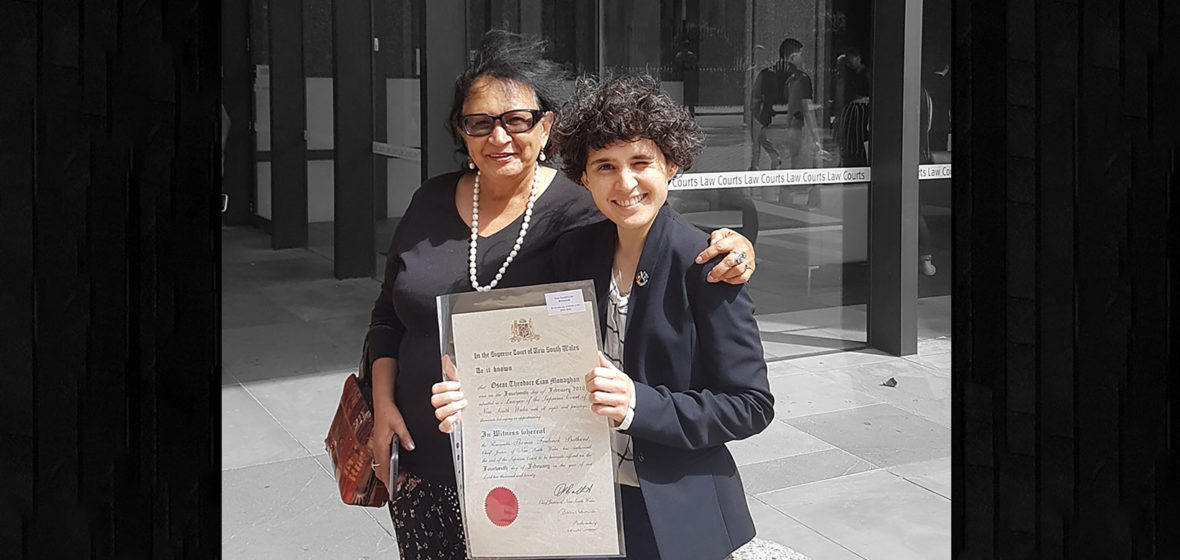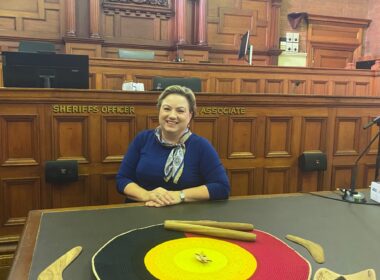Osca Monaghan is a Guugu Yimithirr lawyer from far north Queensland. They were admitted to practice in 2020 and currently works as a criminal defence lawyer for the Aboriginal Legal Service. Monaghan was recently published in Indigenous Legal Judgments: Bringing Indigenous Voices Into Judicial Decision Making. Monaghan discusses their career plans and the theme of this year’s NAIDOC.
What made you want to pursue a career in law?
I received advice from people in my life who said, “You never back down from a fight, you seem to enjoy arguing and when you think you’re right, you go hard… maybe you should be a lawyer?” I had a rather circuitous route to where I am now. I graduated high school in Cairns and went to the University of Queensland, where I did law for a semester before dropping out. The jump from leaving my family to go to university was hard. I was all alone in Brisbane and wasn’t prepared. It was a massive cultural shock going to a sandstone university. I felt quite marked in some ways and definitely out of my depth. I took a year off study to work in Canberra and be close to my mum. After a year, I enrolled at the University of Sydney and started law again in semester one.
What has been the biggest challenge you’ve faced since entering the profession?
I think the biggest ongoing challenge would be the nature of my work. I’m a criminal defence lawyer and I work with Aboriginal clients who are facing criminal charges and usually have very difficult lives. I also work at the Children’s Court. It’s definitely a big challenge to remain emotionally distanced but still emotionally present with the work because it can be upsetting. My clients are so resilient but it’s hard to see what they’re going through, and the system can feel very unfair. It can be difficult to maintain appropriate professional distance.
Where do you see yourself in five years?
I think I’m torn a little bit. I can see myself heading towards academia. Although obviously that sector is increasingly inhospitable which may be determinative. I’m also drawn to the bar. I guess one of the things that motivates me and helps direct me is to think about where I can be the most useful and where my strengths will have the most impact. I just keep asking myself those questions when opportunities arise and let that determine where I go.
Have you got any advice for other emerging lawyers such as yourself?
It would be to identify what’s important to you as a person first, and then as a lawyer second. It’s easy to kind of lose yourself in this profession and there will be many opportunities clamouring for your attention. So, it’s important to know yourself a little bit and follow your interests and your passions. My other advice is to keep going. I’ve definitely experienced challenges in my professional life and it would have been easy to throw in the towel at various points. I’m proud that I kept going.
What does the NAIDOC theme ‘Get Up, Stand Up, Show Up’ mean to you?
I think it’s basically about acknowledging our own power and taking responsibility for what we can do and the impact we can have. Not shying away from it. For workplaces seeking to implement authentic and meaningful change, it has to be systemic change. Moreover, it has to be an ongoing structural commitment all year round. I think workplaces should interrogate all of the systems and structures they have in place and think about how they can be altered if need be. They need to be open to feedback from Indigenous staff who work there about what they would like to see changed. My main thought is that it can’t just be one week in which Aboriginal people are acknowledged, it needs to be ongoing.
What do you like to do in your spare time?
I basically have two hobbies. One is running – particularly trail running. I’m also currently training for a marathon. Although I did fall over on the weekend, so my training is slightly impacted. My other hobby is knitting. I only have two extremes. If I’m not running, I’m sitting on the couch knitting. I’m currently knitting a sweater for my partner. I think I grossly underestimated the challenge of knitting for a man though, as it’s taking a long time.




